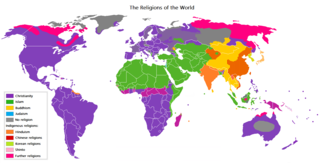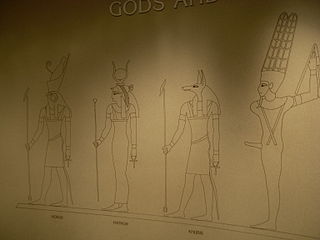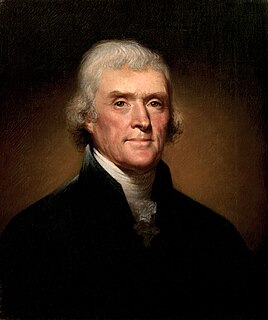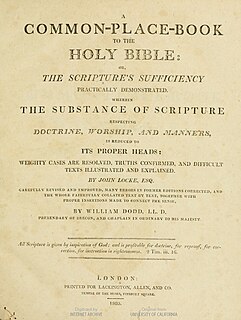
Theism is broadly defined as the belief in the existence of the Supreme Being or deities. In common parlance, or when contrasted with deism, the term often describes the classical conception of God that is found in monotheism – or gods found in polytheistic religions—a belief in God or in gods without the rejection of revelation as is characteristic of deism.
Unitarianism is a Christian theological movement named for its belief that the God in Christianity is one person, as opposed to the Trinity which in many other branches of Christianity defines God as three persons in one being: the Father, Son, and Holy Spirit. Unitarian Christians, therefore, believe that Jesus was inspired by God in his moral teachings, and he is a savior, but he was not a deity or God incarnate. Unitarianism does not constitute one single Christian denomination, but rather refers to a collection of both extant and extinct Christian groups, whether historically related to each other or not, which share a common theological concept of the oneness nature of God.
Apologetics is the religious discipline of defending religious doctrines through systematic argumentation and discourse. Early Christian writers who defended their beliefs against critics and recommended their faith to outsiders were called Christian apologists. In 21st-century usage, apologetics is often identified with debates over religion and theology.
Matthew Tindal was an eminent English deist author. His works, highly influential at the dawn of the Enlightenment, caused great controversy and challenged the Christian consensus of his time.

The argument from inconsistent revelations, also known as the avoiding the wrong hell problem, is an argument against the existence of God. It asserts that it is unlikely that God exists because many theologians and faithful adherents have produced conflicting and mutually exclusive revelations. The argument states that since a person not privy to revelation must either accept it or reject it based solely upon the authority of its proponent, and there is no way for a mere mortal to resolve these conflicting claims by investigation, it is prudent to reserve one's judgment.
The following outline is provided as an overview of and topical guide to Christian theology:
Agnostic theism, agnostotheism or agnostitheism is the philosophical view that encompasses both theism and agnosticism. An agnostic theist believes in the existence of a god or gods, but regards the basis of this proposition as unknown or inherently unknowable. The agnostic theist may also or alternatively be agnostic regarding the properties of the god or gods that they believe in.
A personal god is a deity who can be related to as a person instead of as an impersonal force, such as the Absolute, "the All", or the "Ground of Being".
God the Sustainer is the conception of God who sustains and upholds everything in existence.

In monotheistic thought, God is conceived of as the supreme being, creator deity, and principal object of faith. The conceptions of God, as described by theologians, commonly include the attributes of omniscience (all-knowing), omnipotence (all-powerful), omnipresence (all-present), and as having an eternal and necessary existence. Depending on one's kind of theism, these attributes are used either in way of analogy, or in a literal sense as distinct properties. God is most often held to be incorporeal (immaterial). Incorporeality and corporeality of God are related to conceptions of transcendence and immanence of God, with positions of synthesis such as the "immanent transcendence". Psychoanalyst Carl Jung equated religious ideas of God with transcendental aspects of consciousness in his interpretation.

Anacalypsis is a lengthy two-volume treatise written by religious historian Godfrey Higgins, and published after his death in 1836. The book was published in two quarto volumes numbering 1,436 pages, and contains meticulous references to hundreds of references. Initially printed as a limited edition of 200 copies, it was partially reprinted in 1878, and completely reprinted in a limited edition of 350 copies in 1927. In 1965, University Books, Inc. published 500 sets for the United States and 500 sets for the British Commonwealth with Publisher's Note and a Postface.

Polytheism is the worship of or belief in multiple deities, which are usually assembled into a pantheon of gods and goddesses, along with their own religions and rituals. In most religions which accept polytheism, the different gods and goddesses are representations of forces of nature or ancestral principles, and can be viewed either as autonomous or as aspects or emanations of a creator deity or transcendental absolute principle, which manifests immanently in nature. Most of the polytheistic deities of ancient religions, with the notable exceptions of the Ancient Egyptian and Hindu deities, were conceived as having physical bodies.

The religious views of Thomas Jefferson diverged widely from the orthodox Christianity of his era. Throughout his life, Jefferson was intensely interested in theology, religious studies, and morality.
Jefferson was most comfortable with Deism, rational religion, and Unitarianism. He was sympathetic to and in general agreement with the moral precepts of Christianity. He considered the teachings of Jesus as having "the most sublime and benevolent code of morals which has ever been offered to man," yet he held that the pure teachings of Jesus appeared to have been appropriated by some of Jesus' early followers, resulting in a Bible that contained both "diamonds" of wisdom and the "dung" of ancient political agendas.

Christian deism is a standpoint in the philosophy of religion, which branches from Christianity. It refers to a deist who believes in the moral teachings—but not divinity—of Jesus. Corbett and Corbett (1999) cite John Adams and Thomas Jefferson as exemplars.
Deism, the religious attitude typical of the Enlightenment, especially in France and England, holds that the only way the existence of God can be proven is to combine the application of reason with observation of the world. A Deist is defined as "One who believes in the existence of a God or Supreme Being but denies revealed religion, basing his belief on the light of nature and reason." Deism was often synonymous with so-called natural religion because its principles are drawn from nature and human reasoning. In contrast to Deism there are many cultural religions or revealed religions, such as Judaism, Trinitarian Christianity, Islam, Buddhism, and others, which believe in supernatural intervention of God in the world; while Deism denies any supernatural intervention and emphasizes that the world is operated by natural laws of the Supreme Being.
The Lausanne Committee for World Evangelization (LCWE) defines a nominal Christian as "a person who has not responded in repentance and faith to Jesus Christ as his personal Saviour and Lord." The LCWE notes that such a one "may be a practising or non-practising church member. He may give intellectual assent to basic Christian doctrines and claim to be a Christian. He may be faithful in attending liturgical rites and worship services, and be an active member involved in church affairs." The LCWE also suggests that nominal Christianity "is to be found wherever the church is more than one generation old."
The Religion of Nature Delineated is a book by Anglican cleric William Wollaston that describes a system of ethics that can be discerned without recourse to revealed religion. It was first published in 1722, two years before Wollaston's death. Due to its influence on eighteenth-century philosophy and his promotion of a Natural Religion, the book claims for Wollaston a ranking as one of the great British Enlightenment philosophers, along with John Locke, George Berkeley, and David Hume. It contributed to the development of two important intellectual schools: British Deism, and the pursuit of happiness moral philosophy of American Practical Idealism which appears in the Declaration of Independence.







